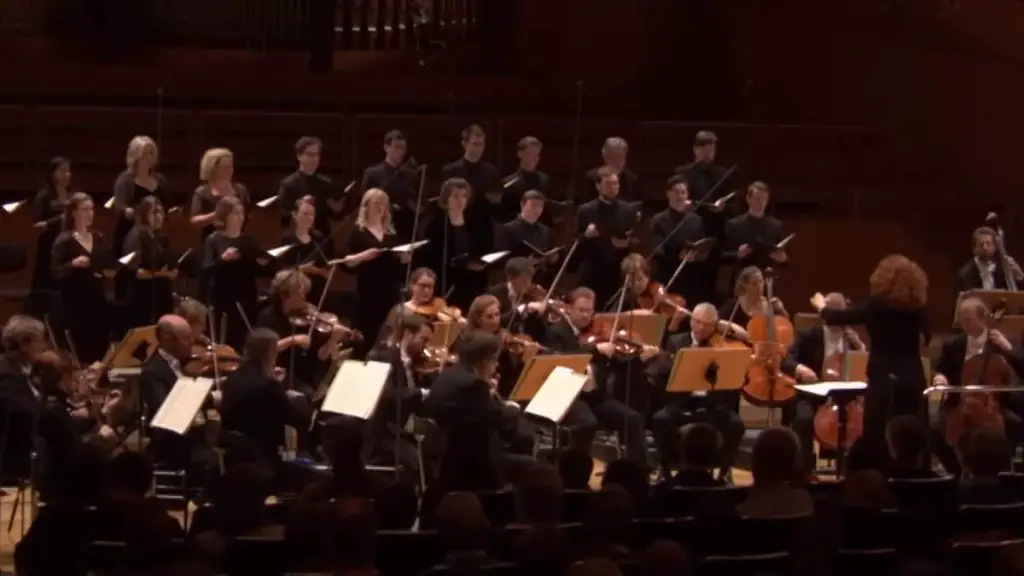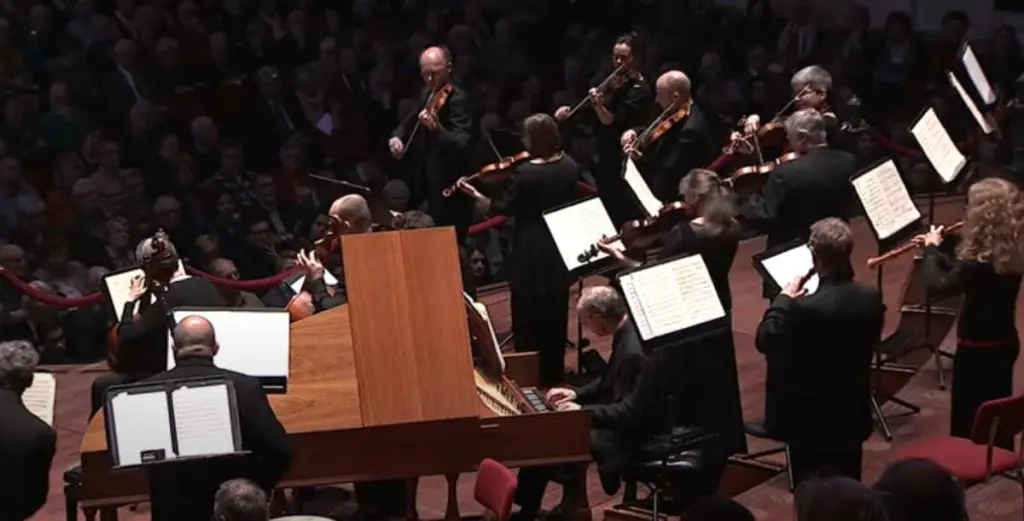Conducted by Andres Mustonen, the Israeli Baroque Collective Barrocade and the Tallinn-based Estonian choir Voces Musicales perform Georg Friedrich Händel’s psalm setting Dixit Dominus (cataloged as HWV 23). The work uses the Latin text of Psalm 110 (Vulgate 109), which begins with the words Dixit Dominus (“The Lord Said”). Soloists: Tal Ganor – soprano, Jaanike Kuusik – Soprano, David Feldman – countertenor (alto).
Georg Friedrich Händel’s Dixit Dominus
The work stands as a remarkable piece in the Baroque choral repertoire. Handel, born in 1685 in Halle, Germany, was a prolific composer whose works spanned various genres, including opera, oratorio, and instrumental music. “Dixit Dominus” is a Latin psalm setting, composed in 1707, during Handel’s early stay in Italy. This period was crucial for his development as a composer, as he was heavily influenced by the Italian musical style, which was then the leading force in European music.
“Dixit Dominus” is based on Psalm 110, a psalm that has been set to music by numerous composers. What makes Handel’s version stand out is its dramatic intensity and the innovative use of vocal and instrumental forces. The work is scored for a five-part chorus, five solo voices (two sopranos, alto, tenor, and bass), and an orchestra consisting of strings and continuo. This composition showcases Handel’s mastery in handling large choral forces, a skill that would later culminate in his famous oratorios like “Messiah.”
The music of “Dixit Dominus” is characterized by its vigorous energy and contrapuntal complexity. Handel employs a variety of textures, from grandiose choral fugues to delicate solo arias and duets. The work is infused with dramatic contrasts, with the music often shifting between reflective and vigorous moods. This is reflective of the Baroque aesthetic, where emotional expression and dramatic contrasts were key elements.
Handel’s use of word painting in “Dixit Dominus” is also noteworthy. Word painting is a technique where the music reflects the literal meaning of the text. For example, ascending scales might be used to depict rising, or a particularly turbulent section of music might accompany words about conflict or battle. This technique, common in the Baroque era, adds an extra layer of meaning and expression to the music.
Despite being one of Handel’s earlier works, “Dixit Dominus” demonstrates many of the qualities that would define his later masterpieces: a flair for dramatic expression, skillful orchestration, and a profound understanding of vocal writing. The work is not just a display of technical prowess but also a deeply expressive interpretation of the psalm text.
In terms of historical context, “Dixit Dominus” was written at a time when Handel was making a name for himself in Italy. The Italian influence is evident in the virtuosic vocal lines and the dramatic flair of the composition. The work was well received, and its success helped establish Handel as one of the leading composers of his time.
“Dixit Dominus” is an exemplary piece of Handel’s early work, showcasing his ability to blend the German contrapuntal tradition with Italianate melodic beauty. It remains a staple in the choral repertoire and continues to be admired for its vitality, technical brilliance, and expressive depth.
Movements and Texts
1. Chorus
The Lord said unto my Lord:
Sit thou on my right hand, until I make thine enemies thy footstool.
Dixit Dominus Domino meo:
Sede a dextris meis, donec ponam inimicos tuos scabellum pedum tuorum.
2. Aria
(alto solo) The Lord shall send the rod of thy power out of Sion:
be thou ruler, even in the midst among thine enemies.
Virgam virtutis tuae emittet Dominus ex Sion:
dominare in medio inimicorum tuorum.
3. Aria
(soprano solo) In the day of thy power shall the people offer thee free will offerings with holy worship.
From the womb before the morning star have I begotten thee.
Tecum principium in die virtutis tuae splendoribus sanctorum.
Ex utero ante luciferum genui te.
4. Chorus
The Lord swore, and will not repent:
Juravit Dominus et non poenitebit eum:
5. Chorus
Thou art a priest forever after the order of Melchisedech.
Tu es sacerdos in aeternum secundum ordinem Melchisedech.
6. Soloists and chorus
The Lord upon thy right hand,
shall wound even kings in the day of his wrath.
Dominus a dextris tuis,
confregit in die irae suae reges.
7. Chorus
He shall judge the nations,
fill the places with destruction, and shatter the skulls in the land of the many.
Judicabit in nationibus,
Implebit ruinas, conquassabit capita in terra multorum.
8. Soprano duet and chorus
He shall drink of the brook in the way,
therefore shall he lift up his head.
De torrente in via bibet,
propterea exaltabit caput.
9. Chorus
Glory be to the Father, and to the Son, and to the Holy Spirit.
As it was in the beginning, is now; and ever shall be, a world without end. Amen.
Gloria Patri, et Filio, et Spiritui Sancto,
Sicut erat in principio, et nunc, et semper, et in saecula saeculorum. Amen.
Sources
- Dixit Dominus (Händel) on Wikipedia
- Chopin: Scherzo No. 3 [İlyun Bürkev] - September 14, 2024
- César Franck: Violin Sonata [Argerich, Capuçon] - September 8, 2024
- Beethoven: Piano Sonata No. 23 “Appassionata” [Anna Fedorova] - September 7, 2024

